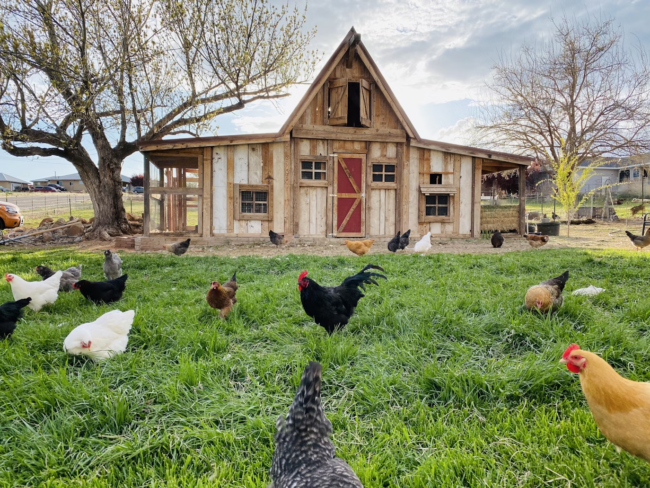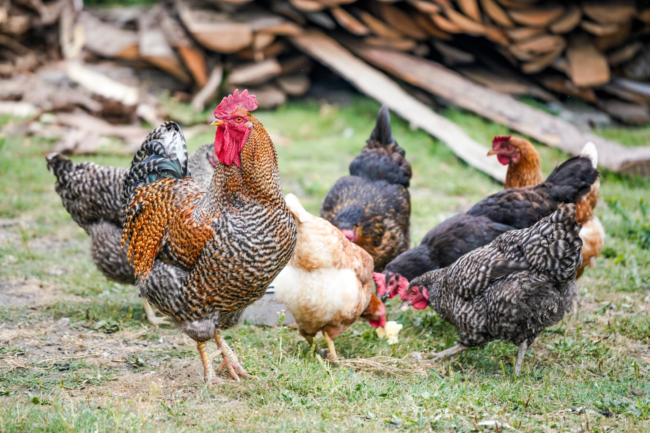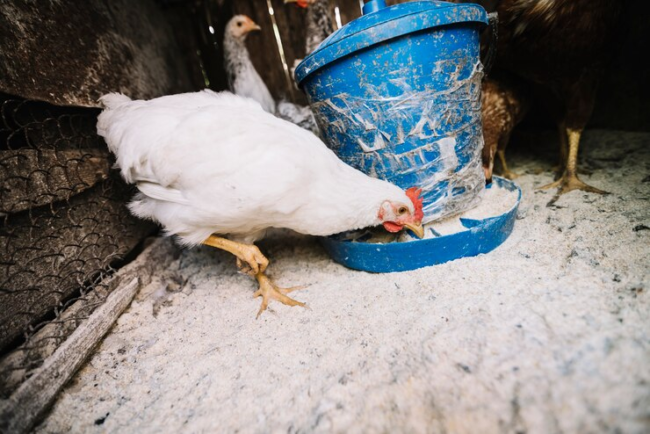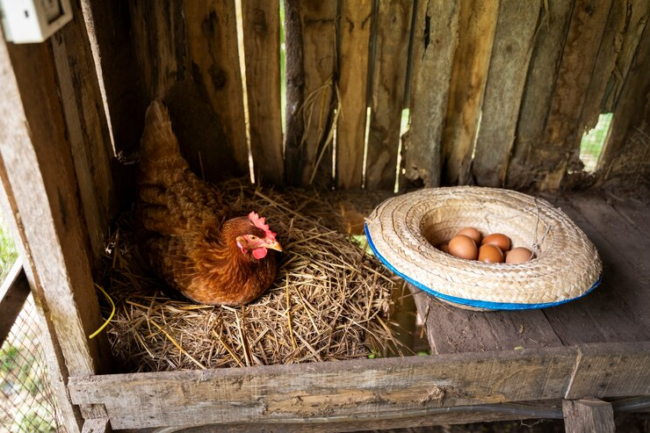
Sustainable backyard living combines the joys of raising chickens with eco-friendly practices like solar power to create a healthier home and environment. Whether it’s cultivating fresh eggs, responsibly managing chicken waste, or integrating renewable energy systems, this guide will help you establish a sustainable and rewarding lifestyle in your backyard.
Here’s how to sustainably raise chickens in your own backyard.
Select Chicken Breeds That Meet Your Needs
One of the first steps in sustainable chicken keeping is selecting breeds that align with your goals.
For example, if your goal is eggs, poultry experts at Smallholder Magazine advise:
“All breeds and types of hen produce nutritionally the same eggs, either smaller in the case of bantams or larger for certain breeds. Some pure breeds lay better than others and within the pure breed, there are so-called ‘laying strains’ that produce more eggs than other birds of that breed.”
If you are looking to add variety, consider blue egg laying chicken breeds like Ameraucanas, Cream Legbars, and Cuckoo Marans, known for their colorful eggs and adaptability in backyard settings.
Establish a Sustainable Water System
Water is an essential resource for your chickens, and sustainable management is key.
Incorporating a rainwater harvesting system alongside a solar farm water pump is an efficient way to maintain a steady, renewable water supply. This setup allows you to collect and store rainwater, reducing reliance on municipal water sources. The addition of solar power ensures you’re minimizing energy use and staying eco-friendly.
A small-scale solar pump system not only provides water for your flock but can also double as a resource for garden irrigation, making it an essential tool for a self-sustained homestead. Pair it with a filtration system to ensure clean, safe drinking water for your chickens.
Regular maintenance is crucial, as a reliable water source promotes better health and productivity within your flock.
Craft an Eco-Friendly Chicken Coop
An eco-conscious coop design forms the backbone of sustainable chicken keeping. Use reclaimed or recycled materials to build the structure, reducing construction waste and costs.
Ensure adequate ventilation and insulation so the coop maintains optimal temperatures without requiring artificial heating or cooling, further conserving energy.
Incorporate features like nesting boxes, perches, and easy-to-access composting areas for managing waste efficiently.
Chicken manure makes an excellent organic fertilizer for your garden, allowing you to close the loop in your backyard ecosystem and support plant growth naturally.
| Important: Provide one nest box per 4–5 hens and ensure roosting areas are available, as chickens prefer elevated spaces. Allow at least 3–5 square feet per bird and include insulation, ventilation, and a heat source for colder months. |
Promote Free-Ranging and Natural Behaviors

Encouraging natural behaviors in your chickens is another cornerstone of sustainable backyard farming. Allowing your chickens to free-range in designated areas lets them forage for seeds, insects, and greens, reducing dependence on commercial feed while improving their health.
To protect both your flock and the environment, avoid using harmful pesticides or synthetic fertilizers in your yard.
Rotational free-ranging areas can prevent overgrazing, give the soil time to recover, and ensure a steady supply of natural forage for your chickens.
Protect Your Chickens with Thoughtful Predator Prevention
Safety is paramount for backyard chickens. Natural predators like raccoons, foxes, and hawks can decimate a flock if precautions aren’t taken.
Start by building a sturdy coop with no openings larger than a quarter to keep small predators out. Elevate the coop to prevent burrowing predators from bypassing the floor, and secure all doors and windows to make them predator-proof.
Use motion-activated lights or alarms to scare off nocturnal threats, and fully enclose the chicken run with secure fencing for added protection. For aerial predators like hawks, install netting or tarps over the run.
Cleaning the surrounding area regularly—removing tall grasses, debris, and other hiding spots—will make the space less attractive to predators.
Provide a Balanced Diet for Optimal Chicken Health

Chickens need a mix of grains, proteins, vitamins, and minerals to thrive. Grains like corn, wheat, or oats are excellent energy sources, while protein-rich additions, such as soybean meal or mealworms, support growth, egg production, and feather health.
Laying hens require large amounts of calcium to produce strong eggshells, with their feed typically containing 2.5% to 3.5% calcium. In contrast, growing chickens only need 1.2% calcium, and feeding them a high-calcium diet can lead to kidney damage.
To support high-producing laying hens, it may be necessary to provide crushed oyster shells on a free-choice basis, as some hens require additional calcium beyond what standard feed supplies. Regularly monitor eggshell quality, and if you notice thin or easily cracked shells, introducing oyster shell supplements can improve shell strength and prevent breakage.
To make chicken nutrition sustainable, integrate locally sourced feeds, kitchen scraps, and garden waste into their diet. Foraging is equally important—allow your chickens to access natural areas where they can hunt for insects and worms, enriching their diet naturally.
| Note: Provide enough feeder space for all chickens to eat at once, and position troughs at the level of their backs to ensure access and reduce feed spillage. |
Foster a Healthy Environment in the Coop
Cleanliness and ventilation are non-negotiable for a sustainable and healthy coop. A dirty coop encourages ammonia buildup and attracts pests, leading to respiratory diseases and an unhealthy flock.
Spot-clean weekly and deep-clean the entire coop seasonally. Replace soiled bedding, sanitize feeders and waterers, and consider adding a deep litter-based compost layer to reduce waste accumulation.
Proper ventilation is another critical factor. Good airflow in the coop prevents moisture buildup and moderates extreme heat or cold, both of which can stress chickens.
Incorporating windows or vents with predator-proof screens can facilitate air movement while keeping your flock secured.
Integrate Chickens into Your Garden Ecosystem
Chickens can play a vital role in your backyard garden. They naturally aerate the soil as they scratch and provide nitrogen-rich manure that, when composted, is an excellent fertilizer.
Allow supervised access to certain areas of your garden, especially before you plant, as chickens can clear weeds and eat insects that harm crops. They’re particularly effective against pests like slugs, snails, and grasshoppers.
However, chickens can damage tender plants and seedlings. Protect valuable crops with fencing or cover young plants with mesh netting.
Raised garden beds are another effective way to allow chickens to roam freely without risking damage to your plants. Additionally, providing sacrificial plants, such as clover or dandelions, can redirect attention away from critical areas.
Use Deep Litter Bedding for Natural Waste Management

The deep litter method is an eco-friendly and low-maintenance approach to managing chicken waste in the coop.
By layering organic materials like straw, wood shavings, or dry leaves on the coop floor, you not only provide your chickens with a clean and insulated environment but also create a natural composting system.
As chickens scratch and mix the bedding, manure gradually breaks down, minimizing odors and creating nutrient-rich material. Turn and replace the bedding periodically, and after a few months, you’ll have compost ready to enrich your garden soil.
To maximize the litter method’s benefits, ensure the coop remains dry and well-ventilated to avoid excessive ammonia buildup.
Create a Sustainable Backyard Today
By selecting the right chicken breeds, maximizing space efficiency, and incorporating renewable resources like a solar-powered water pump, your backyard can thrive sustainably. Focus on eco-friendly coop designs, predator protection, and adding chickens to garden spaces for natural pest control and soil enrichment.
With thoughtful planning and responsible practices, you can enjoy the rewards of chickens, renewable energy, and a greener home. Start building your eco-friendly oasis today!

